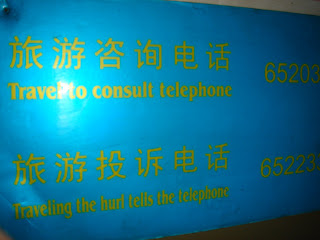Funny Chinese signs with broken English are all over the Internet. It's one thing seeing them on the Internet, but seeing them for yourself you realise how truly bad the situation really is. It's so difficult to believe that people can screw up so royally this often, but it couldn't be more true. I've put together a collection of some of the wacky signs and such that we saw in 9 days in China, without us actively searching for any! Hopefully this put things into perspective for some people.
 Found outside the Oriental Pearl TV Tower; some of these are hilarious (click image to read)
Found outside the Oriental Pearl TV Tower; some of these are hilarious (click image to read) What can I say...
What can I say...
Would love to know what they meant to say!
And then there were some bad ones even at the RoboCup arena. The fact that this is an international event amazes me that these were there.
 Look closer at the spelling of RoboC*u*p. That's the spelling used on the official t-shirts, but the certificates were worse -- Robocuop!
Look closer at the spelling of RoboC*u*p. That's the spelling used on the official t-shirts, but the certificates were worse -- Robocuop!
















LOL
ReplyDeleteThings fare a bit better in Indonesia, but when you go to smaller cities, you can find similar phenomenons. They're certainly trying to look impressive. Gotta award the effort, though :)
LOL marco!
ReplyDeleteOutstanding :) Thank you! You find a mild form of such signs in Malaysia... but the Chinglish really take it to the max :)
Another one was the English menus with items such as "Bean curd fries the chicken", those were everywhere!
ReplyDeleteFrom talking to a Chinese friend they translate it literally word for word ignoring the context. For example, the "Travelling the hurl tells the telephone" sign is meant to say "Travel complaint number". The one character on its own means "hurl", but combined with the following character it changes meaning to "complain".
Marco,
ReplyDeleteI went to China in 2005 and saw the 'Traveling the hurl tells the telephone' sign on a boat during a boat trip on the canals of Suzhou. I thought you might like to see this menu item:
http://i211.photobucket.com/albums/bb294/dutchdummy/64aWhatsForDinner.jpg
The one thing I always say about Chinglish is that it at least demonstrates a willingness to try. And I'm not exactly in a position to criticise, I don't speak a word of Chinese.
ReplyDeleteBut at the same time, Chinglish musn't crop up in important documentation and you'd hope that a professional translation agency would be used for that kind of thing. But most of the time, it's harmless. And personally, I think that "Tender, fragrant grass. How hard-hearted to trample" is a lot better than "Keep off the grass".